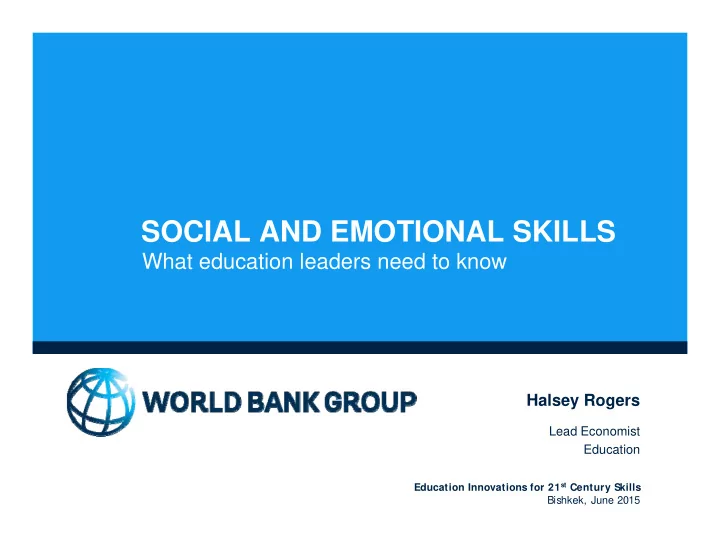

SOCIAL AND EMOTIONAL SKILLS What education leaders need to know Halsey Rogers Lead Economist Education Education Innovations for 21 st Century Skills Bishkek, June 2015
Conceptual framework Building a creative economy through education Intelligence Creativity & Academic innovation performance Personality traits (cognitive & social/emotional Employment & skills) productivity Socioeconomic background Economic Education system policies Creative economy Source: Elizabeth King and Halsey Rogers, Intelligence, personality, and creativity: Unleashing the power of intelligence and personality traits to build a creative and innovative economy (World Bank, 2015)
Traditional focus has been on intelligence (or initial cognitive ability) & cognitive skills Building a creative economy through education Intelligence Creativity & Academic innovation performance Personality traits (cognitive & social/emotional Employment & skills) productivity Socioeconomic background Economic Education system policies Creative economy Source: King and Rogers ( 2015)
Social & emotional skills: What are they? Core idea: Skills that aren’t measurable through traditional cognitive-skill assessments Also known as non-cognitive skills or soft skills or personality skills Overlap with transversal skills and core skills Examples: self-control, persistence, teamwork skills Challenges Measurement challenges: self-report, experiment, behavioral observation Research challenges: establishing predictive power Policy challenges: how to build these skills Many others also grappling with these challenges; e.g., OECD and UNESCO-Bangkok Governments (including in this region) S ocial and emotional skills: What education leaders need to know
Personality traits determine academic performance & skill formation Building a creative economy through education Intelligence Creativity & Academic innovation performance Personality traits (cognitive & social/emotional Employment & skills) productivity Socioeconomic background Economic Education system policies Creative economy Source: King and Rogers (2015)
Personality traits determine academic performance & skill formation Examples of personality traits: The “Big Five” Openness to experience Conscientiousness/perseverance Extraversion Agreeableness Emotional stability These matter for success in schooling (beyond intelligence, SES) Conscientiousness is one example Overall, can explain outcomes as well as intelligence does (Heckman et al.) S ocial and emotional skills: What education leaders need to know
Social/emotional skills determine economic outcomes Building a creative economy through education Intelligence Creativity & Academic innovation performance Personality traits (cognitive & social/emotional Employment & skills) productivity Socioeconomic background Economic Education system policies Creative economy Source: King and Rogers (2015)
Social/emotional skills determine economic outcomes Social & emotional skills Build on personality traits, but with emphasis on malleability SE skills are an important determinant of economic outcomes Indirect effect, through cognitive skills Direct effect on earnings, for example through extraversion and conscientiousness Both cognitive and non-cognitive skills contribute to creativity What you know matters for creativity cognitive skills are important But non-cognitive skills likely matter too – e.g., openness to experience, persistence S ocial and emotional skills: What education leaders need to know
The education system can promote social/emotional skills Building a creative economy through education Intelligence Creativity & Academic innovation performance Personality traits (cognitive & social/emotional Employment & skills) productivity Socioeconomic background Economic Education system policies Creative economy Source: King and Rogers (2015)
The education system can promote social/emotional skills Early childhood development (ECD) Conscientiousness and self-control develop early in life Long-term effects on non-cognitive skills (e.g., Perry Preschool experiment) Curriculum and teaching Effective programs targeted at social and emotional learning (e.g., Seattle Social Development program in primary, cognitive-behavioral intervention for at-risk teens) Programs to recruit and develop teachers with strong non-cognitive skills Education system structure Timing of vocational tracking University admissions policies Need to evaluate and measure S ocial and emotional skills: What education leaders need to know
What are the cognitive and social/emotional skills of adults? STEP skills measurement program 18 participating countries China Serbia Serbia (Yunnan Armenia Kosovo Kosovo Province) Azerbaijan Libya Libya Georgia Macedonia Lao PDR Sri Philippines Philippines Vietnam Kenya Lanka East Timor East Timor Wave 1 – Completed 2013 Wave 1 – Completed 2013 Wave 2 – Completed 2014 Wave 2 – Completed 2014 Wave 3 – 2014/2015 Wave 3 – 2014/2015 Indicates the country had an employer survey 10
Economic policies can promote creative use of all skills Building a creative economy through education Intelligence Creativity & Academic innovation performance Personality traits (cognitive & noncognitive Employment & skills) productivity Socioeconomic background Economic Education system policies Creative economy Source: King and Rogers (2015)
Country application to Korea Beyond cognitive skills to social/emotional skills and creativity Make formal-school learning more engaging and creative, e.g.: • Adopt curriculum and assessment reforms • Improve teacher training Reform university admissions, e.g.: • Recognize that lasting change requires reorienting university admissions • Use holistic admissions system to reduce costs and incentivize diverse skills Strengthen non-university pathways to job market , e.g.: • Create more attractive TVE ( meister high schools, current reforms) Strengthen economic policies to make more creative use of skills , e.g.: • Promote competition in services sector, stimulate SMEs more efficiently • Ensure that everyone (including women, youth) has full opportunity to use their skills Social and emotional skills: What education leaders need to know
Final word: How can this social/emotional lens guide innovation to promote 21 st -century skills? Social and emotional skills matter • Effects are both direct and indirect • “Skills beget skills” (Heckman, OECD) And they can be nurtured • Programs and practices can improve social & emotional skills (e.g., ECD, CBI) • But we still need much more evidence on what works Don’t forget the basics • In many systems, students lack even most basic literacy/numeracy skills • So make sure focus on social/emotional skills and creativity complements—and doesn’t distract from—efforts to build these basic cognitive skills And think about the costs of generating skills • Consider costs to families and students, not just to the public sector Social and emotional skills: What education leaders need to know
SOCIAL AND EMOTIONAL SKILLS What education leaders need to know Halsey Rogers Lead Economist Education Thank you! Education Innovations for 21 st Century Skills Bishkek, June 2015
Recommend
More recommend